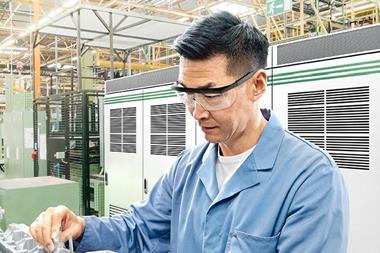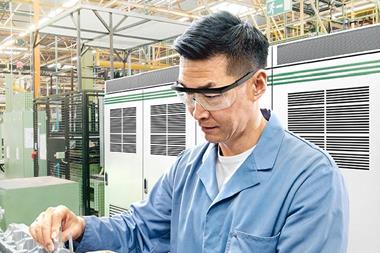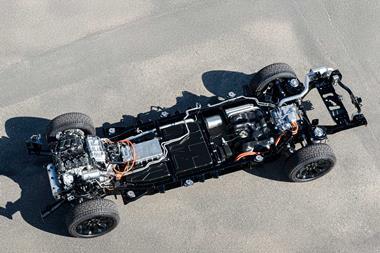For precision cleaning of metalworked parts, Castrol’s Techniclean XBC has been designed with ‘circular economy’ characteristics built-in, making it durable and reusable to help reduce water consumption and process costs
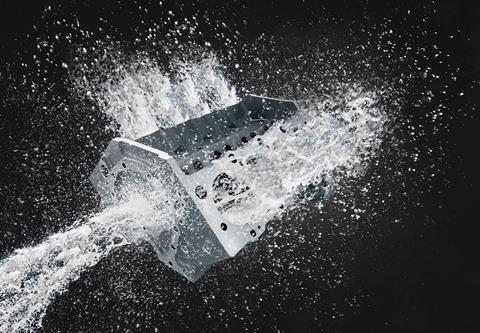
When cleaning fluids are underperforming, they can compromise productivity and increase operating costs. Also, the coolant elements they wash off can push up the development of foam and create unwanted residues on parts and components.
As well as a higher cost, the result is more frequent disposal and replacement of the wash fluid. “Techniclean XBC cleaning fluid helps companies to reduce operational costs and carbon footprint,” says Michael Petzold, global product manager at Castrol. “Techniclean XBC fulfils the latest requirements for a modern cleaner used in industrial metalworking process chains and it offers much more than just being a high performance cleaning fluid,” he explains. “It is designed with ‘circular economy’ characteristics built-in: it is durable and reusable, so it cuts consumption of raw materials, cuts waste disposal and hence reduces the overall environmental footprint.”
The key to this ‘magic bullet’ is the fluid’s compatibility with Castrol’s range of Alusol XBB and Hysol XBB coolants. When Techniclean XBC has reached the end of its useful life, rather than just throw it away – with all the waste disposal and maintenance cost involved – it can be recycled and reused in the Alusol and Hysol XBB coolant systems.
The chemical DNA is important. All XBB coolants and XBC cleaners are designed without Boron or formaldehyde-releasing biocides – thus the ‘XBB’ designation (the C in Techniclean’s ‘XBC’ stands for ‘cleaning’). They all comply with the latest HSE legislation. Techniclean XBC is available in two variants to meet local requirements: Techniclean 80 XBC containing MEA (Monoethanolamine) and Techniclean 90 XBC, formulated without MEA. Their compatible formulation design means the Techniclean cleaners can be added to Alusol XBB and Hysol XBB emulsions without compromising the coolant performance.
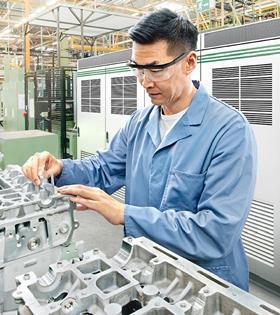
Sustainability credentials
Many of the ‘green’ or supposedly environmentally responsible solutions are not particularly good at their jobs. It can be a false economy if a manufacturer has to use two, three or four times as much product to achieve the same standards as a supposedly expensive and polluting alternative. Petzold is keen to stress that this is not the case with Techniclean XBC.“It’s reusability does not come at the price of lower performance. If anything, it demonstrates high-level cleaning performance and performs even better across a broad application spectrum.
It has low foaming characteristics across a wide temperature range and is usable in low-temperature cleaning operations in contemporary spray, intensive flood-wash and high-pressure equipment [based on 2017 Castrol’s laboratory tests and 2018 customers’ trials]. Hence it can help lowering the heat energy consumption,” Petzold says.
He continues: “We established this was the case within our own laboratories and have been able to demonstrate that it delivers to the expected standard, in the field, in customers’ operations on their own premises. We also proved to customers’ complete satisfaction that it has excellent demulsifying performance, which gives it a longer bath life in the first place, as well as enabling easy skimming.”
Closing the circle
The concept of the ‘circular economy’ was codified by the Ellen MacArthur Foundation. The yachtswoman has seen at first hand the damage that waste and thoughtless disposal can do to the environment, from poisoning wildlife to physical contamination of our oceans
The ‘circular challenge’ calls for minimisation of waste, for resources to be continually regenerated over time, and the optimal utilisation of products and possessions through circularity built-in to design, leading to minimisation of waste, and round again, unendingly. Industrial manufacturing is familiar with the concept of recyclability and has, through encouragement, cajolement, and legislation, got to the stage where 95% of a new car sold today in Europe can now be recycled at the end of its life.
In 10 years, that figure may be higher – there is talk of 99%. That is a remarkable achievement in its own right but that positive environmental performance can be negated if the processes used in manufacture are polluting or wasteful and consume high levels of energy and natural resources. Castrol has been working for years to reduce the levels of oil contained in its lubricants and metalworking fluids. At the same time, it has been collaborating with customers since the last century on ways to reduce consumption and to cut waste disposal, with the ultimate aim of ‘zero to landfill’.
Through a partnership with Castol, Renault is set to save waste and water this year with Techniclean XBC. There is urgency in its quest. China, which will soon be indisputably the largest economy in the world, is legislating under its Made in China 2025 strategy for factories to reduce waste to zero. There is no choice but to drive down on waste and consumables, and Techniclean XBC is very much part of that scenario. But it isn’t all about complying with legislation. Every penny that leaves the factory in the form of waste is a penny off the bottom line. Every avoidable gram of carbon is a cost that can – and should – be eliminated.
Local legislation and customer requirements regarding the use of monoethanolamine (MEA) have steered Castrol’s development of Techniclean XBC into two directions:
Techniclean 80 XBC: Classic MEA-containing variant – for markets where the use of MEA is not an issue
Techniclean 90 XBC: MEA-free variant for markets and customers that are affected by MEA-restrictions, such as Germany, Japan and South Korea































